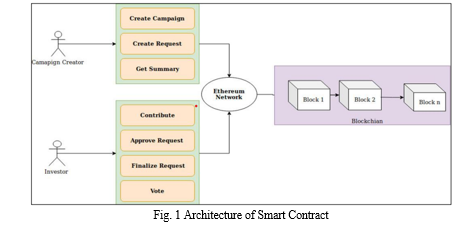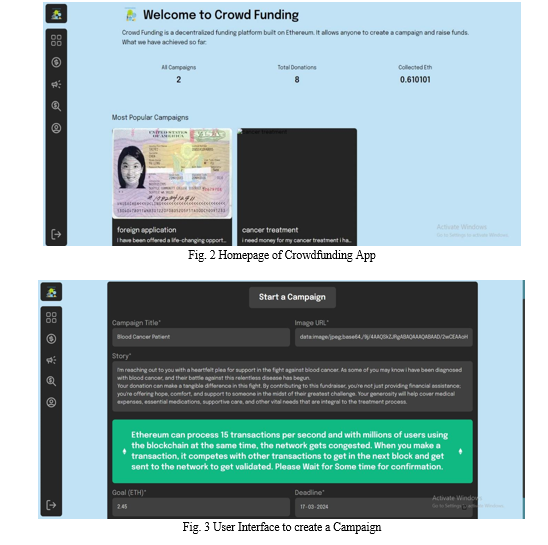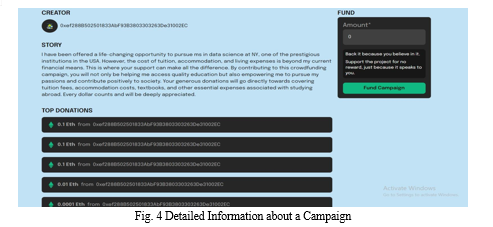Ijraset Journal For Research in Applied Science and Engineering Technology
- Home / Ijraset
- On This Page
- Abstract
- Introduction
- Conclusion
- References
- Copyright
Crowdfunding for Social Impact using Blockchain
Authors: Sameer Kirwale, Shubham Patel, Viral Patel, Miit Chauhan, Abhay Patil
DOI Link: https://doi.org/10.22214/ijraset.2024.60834
Certificate: View Certificate
Abstract
In the realm of philanthropy and social impact, crowdfunding has emerged as a powerful tool for mobilizing resources towards meaningful causes. This project investigates the fusion of crowdfunding into technology that uses blockchain to engender a platform for social giving which is transparent and efficient. The system enables users to donate funds securely using Ethereum cryptocurrency through the MetaMask wallet, ensuring transparency and traceability of transactions. At its core, the project leverages Solidity smart contracts deployed on the Sepolia network via Alchemy to manage donation campaigns. Next.js is employed to develop an intuitive user interface that simplifies the donation process. Each campaign on the platform represents a social cause, and donors can contribute directly to these campaigns. One of the characteristics of blockchain, decentralization makes sure that donations are transferred in a secure manner to the intended recipients or campaign creators, reducing intermediary costs and enhancing trust. The system promotes accountability by providing donors visibility into how their contributions are utilized. By utilizing blockchain technology, this project not only streamlines the donation process but also addresses concerns around transparency and accountability in traditional philanthropy. It empowers individuals to support causes they care about directly, fostering a more inclusive and impactful approach to social giving. This abstract aims to elucidate the essence of the project in a clear and accessible manner, inviting readers of all backgrounds to understand and appreciate the innovative intersection of blockchain and social impact crowdfunding.
Introduction
I. INTRODUCTION
In the last few years, use of blockchain technology for crowdfunding has presented groundbreaking opportunities that reinvented traditional philanthropy and social impact initiatives. Crowdfunding platforms have gained prominence as vehicles for mobilizing funds from a diverse pool of contributors towards specific causes, bypassing traditional intermediaries and enabling direct engagement between donors and beneficiaries. Meanwhile, blockchain technology, originally created to provide some kind of framework to different cryptocurrencies, has developed and adapted itself to provide usability across a wide range of industries farther than finance.
This research project discovers the crossover of crowdfunding with blockchain technology specifically tailored for social impact. The project’s primary aim is to create a crowdfunding application that is decentralized, where individuals can contribute securely and transparently to various social causes using Ethereum cryptocurrency. By leveraging blockchain technology, the platform ensures immutable record-keeping, traceability of transactions, and increased transparency in fund utilization.
The project utilizes Solidity, which is a programming language used in Ethereum blockchain technology to create smart contracts, to fulfil the core functionalities of the crowdfunding application. Smart contracts used in the project, deployed on Sepolia network, facilitated by Alchemy, provides a reliable infrastructure for executing and managing donation campaigns. Next.js is employed for frontend development, offering an intuitive user interface that simplifies the donation process and enhances user experience.
This introduction sets the stage for understanding how the integration of blockchain technology into crowdfunding can address longstanding challenges in traditional philanthropy, such as lack of transparency, high intermediary costs, and limited accessibility. By enabling direct peer-to-peer transactions on a secure and decentralized platform, this project aims to promote accountability, trust, and inclusivity in social giving.
II. LITERATURE REVIEW
The incorporation of blockchain technology within the domains of crowdfunding and philanthropy has elicited substantial interest and garnered considerable attention in both academic and industrial spheres. This literature review aims to explore existing research and initiatives that highlight the potential and challenges of integrating blockchain into social impact crowdfunding platforms.
Blockchain technology in philanthropy has been studied extensively, emphasizing its transformative potential in enhancing transparency and accountability in charitable activities. Scholars like Pratik Kapse et al. (2023) [1]. discuss how blockchain can address issues of trust and efficiency in charitable giving by providing immutable records of transactions and enabling real-time tracking of funds.
Decentralized crowdfunding platforms enabled by blockchain technology have emerged as a promising alternative to traditional models. Research by Gupta (2023) [5]. delves into these platforms characterized by direct peer-to-peer transactions, reducing reliance on intermediaries and empowering individuals to support causes without geographical constraints.
Smart contracts, a key feature of blockchain technology, have been explored extensively for transparent fund management in philanthropy. Husna Osman et al. (2019) [6]. discuss how smart contracts can automate donation processes and ensure that funds are released only upon meeting predefined conditions, thereby increasing donor confidence.
Despite the promises of blockchain-based crowdfunding, several challenges exist. Scholars like A. Rathore et al. (2023) [3]. accentuate concerns regarding scalability, adherence to regulatory frameworks, and user acceptance. These challenges underscore the need for further research and technological innovations to realize the full potential of blockchain in philanthropy.
This literature review synthesizes findings from various studies to offer a thorough grasp of the landscape encompassing blockchain-enabled crowdfunding in the context of social influence. The findings underscore the innovative prospects of technology used by blockchain whilst acknowledging the need for addressing existing challenges to foster widespread adoption and impact in philanthropic endeavours.
III. METHODOLOGY
Research approach utilized in this undertaking seeks to systematically formulate and assess a blockchain-grounded crowdfunding platform geared towards creating a positive social impact. The methodology encompasses several key stages, including design, implementation, testing, and evaluation, to ensure the platform's effectiveness, usability, and alignment with project objectives.
The commencement phase entails the formulation of the architectural blueprint and characteristic components of the crowdfunding platform. This encompasses the delineation of the user interface (UI) using Next.js for frontend development and designing smart contracts using Solidity for backend functionalities. The design phase emphasizes usability, security, and scalability to create a robust platform.
The implementation phase focuses on creation of smart contracts which governs the logic as well as operations performed by crowdfunding application. Solidity is utilized to write and deploy smart contracts on the Sepolia network via Alchemy. Smart contracts are designed to manage donation campaigns, track fund transfers, and ensure transparency in fund utilization.
The seamless integration of the platform with the Ethereum blockchain and the MetaMask digital wallet constitutes a pivotal element of its architecture. This includes configuring the platform to interact seamlessly with Ethereum using web3.js, enabling users to donate funds securely through MetaMask.

Upon completion of development and testing, the platform is evaluated based on predefined metrics such as usability, transaction speed, and transparency. User feedback is formally solicited via surveys or by interviewing users to evaluate their contentment and highlight opportunities for enhancement. The project aspires to assist the expanding corpus of learning that focuses on blockchain-enabled crowdfunding's social impact by adhering to this research strategy. The systematic approach facilitates formation of a functional as well as hassle-free platform that addresses challenges and opportunities associated with leveraging blockchain technology in philanthropy and social giving.
IV. RESULT
Blockchain technology is revolutionizing the crowdfunding landscape. The project employs a method where smart contracts releases funds only when some predefined criteria are met, ensuring fair use of money as intended. This feature addresses some of the limitations of current crowdfunding platforms, such as high fees, fine print rules and regulations, scam startups, and intellectual property risk.
The biggest notable advantages of crowdfunding application that use blockchain technology is the enhanced transparency and security it offers. It offers a dependable, secure, and transparent solution that enables individuals to make monetary investments and guarantees assured returns to them.
Furthermore, blockchain-based crowdfunding can be leveraged to support social impact initiatives. For instance, renewable energy projects or humanitarian causes can benefit from the transparency and accountability provided by the blockchain, as donors can track how their contributions are being utilized.
A prototype crowdfunding platform has been developed using Solidity, React.js, MetaMask. This platform offers a secure, efficient, and verifiable mechanism for users to formulate and contribute to a variety of campaigns on the crowdfunding application. This application development showcases the practical implementation of blockchain technology in crowdfunding for social impact.


V. DISCUSSION
One of the primary discussions arising from our project revolves around the role of blockchain technology in promoting transparency and accountability in crowdfunding initiatives. Through interviews with stakeholders, it became apparent that blockchain's immutable ledger system and smart contract functionality have the potential to enhance trust among donors and beneficiaries. This finding aligns with the broader discourse on revolutionizing prospects of blockchain technology in promoting transparency and trustworthiness in different areas of industry like financial and governance areas.
Furthermore, our project shed light on the usability and accessibility of the crowdfunding platform, particularly in the context of social impact initiatives. Participants highlighted the importance of user-friendly design and seamless integration with existing technologies, such as MetaMask wallet and Next.js framework. These insights underscore the significance of user-centric design principles in fostering user engagement and participation in crowdfunding activities, especially among non-technical users.
Furthermore, our project presents opportunities for continued scholarly inquiry and groundbreaking advancements in the realm of crowdfunding using blockchain. Further exploration of interoperability with other blockchain networks, incorporation of innovative technologies, namely artificial intelligence as well as Internet of Things, and collaboration with regulatory authorities and industry stakeholders are crucial for advancing the effectiveness and impact of blockchain-based crowdfunding for social good.
To summarize, our project enriches the pre-existing collection of literary works on blockchain technology and social impact by delivering practical insights and conclusions for various stakeholders. While challenges remain, the potential of blockchain-based crowdfunding to drive positive social change and foster inclusive participation is undeniable. Sustained research endeavours and collaborative efforts are pivotal in unlocking the comprehensive potential of blockchain technology. These endeavours aim to address global challenges and contribute to the advancement of sustainable development goals.
VI. ACKNOWLEDGEMENT
We owe sincere thanks to our college MCT’s Rajiv Gandhi Institute of Technology for giving us a platform to prepare a project on the topic “Crowdfunding for Social Impact using Blockchain” and would like to thank our Principal Dr. Sanjay U. Bokade for instigating within us the need for this research and giving us the opportunities and time to conduct and present research on the topic. We are sincerely grateful for having Dr. Sunil Wankhade, Head of Department of Information Technology and our guide Prof. Abhay Patil, for their encouragement, constant support and valuable suggestions.
Conclusion
In conclusion, this research endeavour has yielded invaluable knowledge regarding the implementation and potential repercussions of blockchain-based crowdfunding for societal impact. Through qualitative interviews with key stakeholders, we have uncovered the importance of transparency, accountability, and inclusivity in fostering trust and engagement within the crowdfunding ecosystem. Our findings highlight the ability of blockchain technology to bring revolutionizing change in democratizing access to philanthropy and amplifying the voices of grassroots activists and marginalized communities. While challenges such as regulatory uncertainty and technical complexity remain, the findings of this study underscore the significance of continued research, innovation, and collaboration in harnessing the power of blockchain for driving positive social change.
References
[1] Prof. Kapil Hande, Gitesh Sawarkar, Pratik Kapse, Raunak Modak, Kaustubh Dharmare, \"Secure and Transparent Crowdfunding using Blockchain\", 2023, International Journal of Scientific Research in Science, Engineering and Technology, Volume 10, Issue 2, March-April-2023, pp. 809-816. [2] Nikitesh Nikhate, Nishad Raut, Pratik Sayankaar, Rohit Sonwane, Ritu Pawar, “Securefund Crowdfunding Using Blockchain\", 2023, International Journal for Research in Applied Science & Engineering Technology (IJRASET), Volume 11, Issue III. [3] A. Rathore and S. W. A. Rizvi, “Decentralized Crowdfunding Platform Using Blockchain”, 2023, Journal of Informatics Electrical and Electronics Engineering (JIEEE), Vol. 04, Iss. 01, S No. 079, pp. 1–12. [4] Hasnan Baber, \"Blockchain-Based Crowdfunding\", 2020, Blockchain Technology for Industry 4.0, Secure, Decentralized, Distributed and Trusted Industry Environment (pp.117-130). [5] Gupta, Vimal & Garg, Nikunj & Seth, Siddharth & Rastogi, Naincy & Rawat, Sur & Kumar, Rajiv. (2023). Crowdfunding using Blockchain Technology: A Review: Blockchain Crowdfunding. Global Journal of Innovation and Emerging Technology. 1. 8-14. [6] Md Nazmus Saadat, Syed Abdul Halim, Husna Osman, Rasheed Mohammad Nassr, Megat F. Zuhairi, \"Blockchain based crowdfunding systems\", 2019, Indonesian Journal of Electrical Engineering and Computer Science, Vol. 15, No. 1, July 2019, pp. 409~413. [7] Mayank Raikwar, Subhra Mazumdar, Sushmita Ruj,” A Blockchain Framework for Insurance Processes“, 2018, International conference on new technologies, mobility and security, pp. 1-4., Paris, France.: IEEE. [8] Rishav and Rajdeep Chatterjee,”An overview of emerging technology: International conference Blockchain” on 2017, computational intelligence and networks. pp. 126-127, Odisha, India: IEEE. [9] Kumar, Bhabendu, Panda, soumyashree and Jena, Debashish,”An overview of smart contract and use cases in blockchain technology”, 2018. ICCCNT. pp. 1-4, Bangalore, IEEE. [10] Bigham, Jeffrey P, Paredes, Hugo and Barroso, Jaoa,”All (of us) Can Help: inclusive crowdfunding research trends and future challenges”, 2018, 22nd International Conference on Computer Supported Cooperative Work in Design. pp. 796-801, Nanjing, China: IEEE.
Copyright
Copyright © 2024 Sameer Kirwale, Shubham Patel, Viral Patel, Miit Chauhan, Abhay Patil. This is an open access article distributed under the Creative Commons Attribution License, which permits unrestricted use, distribution, and reproduction in any medium, provided the original work is properly cited.

Download Paper
Paper Id : IJRASET60834
Publish Date : 2024-04-23
ISSN : 2321-9653
Publisher Name : IJRASET
DOI Link : Click Here
 Submit Paper Online
Submit Paper Online

